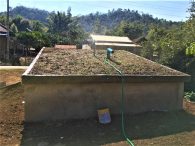One of the main issues of the commercialization of agriculture is the lack of storage capacity for the farmers’ organizations (FOs) especially those that produce fresh vegetables. Without an effective storage system, farmers cannot consolidate their products and manage demand-supply opportunities properly. That is why oftentimes, there is too much supply during peak season and there is not enough supply to the market in other periods of the year.
Some development projects invested in modern cool storage systems for the farmers. However, they completely failed because the system is too big and farmers do not have enough produce to keep in storage. Moreover, the operating cost of the system is very high due to the cost of electricity and its maintenance.
In 2017, Lao Farmer Network (LFN) piloted a zero-energy cool storage system in 3 locations: with the bitter bamboo group in Oudomxay province, with the organic vegetable group in Vientiane capital, and with the vegetable cooperative in Xiengkhouang province. The system is designed based on experiences in an organic farm in Vangvieng, Vientiane province.

The storage is 4 x 4 x 4 meters and 2 meters down from the soil surface. The storage is naturally kept cool by the soil temperature. The storage also connects to cool air sources such as air from spring wells or natural creeks. The cool air comes in and the warmer air goes out of the storage by itself without using any electronic device. The construction costs around USD 2,000 which can keep 2 to 3 tons of vegetables. The temperature is about 4 to 7 degrees Celsius different from the outside.
Based on the experience of the Thongmang organic vegetable group, they can keep cabbages in storage for up to 40 days. Khammone, the head of the group, said, “It is better than nothing. Even though the storage is not cool as refrigerator, but inside the storage, we can keep our produce from wind, sunlight, and heat.”
With this technology, the farmers’ groups now have a storage facility where they can keep their produce when the prices go down. Vegetable groups that sell fresh produce used to throw away the leftover produce because they don’t have anywhere to keep them, but now they can keep them in storage for other uses or while waiting for better market prices. In addition, the Thongmang vegetable group buys vegetables that they cannot grow from other groups in Xiengkhoung and Hoaphan province, and in the past, they cannot do this, but with the zero-energy cool storage, it is now possible.
Among the factors that facilitated this undertaking is the low cost of constructing the cool storage. Farmers can even contribute labor for the construction of the storage. Another is the low operating cost—no electricity is needed to operate the storage facility. Most importantly, this technology responds to the problem of farmers.
However, LFN faced several challenges in implementing this project such as the need to allot more time to water the facility to keep it cool. There is also a need for the storage to be built near a natural cool air source such as a well or a creek. Moreover, the produce that will be stored needs to be pest-free, otherwise, the pest will keep damaging the produce in the storage. LFN also recommends that the storage development must go hand-in-hand with the marketing development of the farmers’ organization—meaning that the farmers group needs to have a marketing plan to purchase the product from members, to stock the produce and have a plan to market them in order to ensure utilization of the facility. Furthermore, LFN recommends that the design can be modified in size, and it requires more action research to find the best model for the specific conditions of the farmer group.

Comments are closed